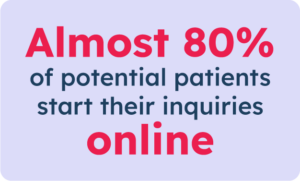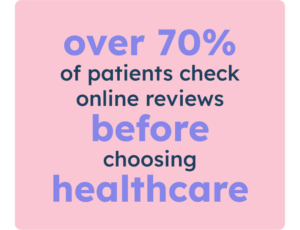You often add “near me” to your online searches, but have you ever wondered how it works? Here’s the explanation: it signals to search engines like Google that you’re looking for options closest to you. Then, the search engine uses your device’s location to refine the results, showing you services or businesses nearby. Simply put, it’s a filtering process that includes geographically convenient results, helping you find what you need in your area more easily.
But that’s not all. It’s not just about the geolocation—search engines need additional information that signals they meet other consumer criteria as well. That’s where local Search Engine Optimization plays its part as local traffic, visibility, and brand awareness amplifier.
Why is this important for healthcare? Almost 80% of potential patients start their inquiries online, and research shows that “near me” searches for health-related services have doubled since 2015. This makes it clear that local SEO for healthcare should be on top of your medical practice’s list in order to thrive in the growing healthcare market.
Let’s see what local SEO means for your healthcare business and how services like Google Business Profile (GBP) can improve it.
Becoming The Favorite “Near Me” Option: Using Local SEO for Healthcare
In essence, local SEO for healthcare ensures your practice pops up in search results when someone in your area searches for the healthcare services you offer. But it’s not just about location—ranking at the top of local SERP (search engine results page) is the result of a strategic approach tailored to point out the character of your healthcare practice supported by reputable relevance and credibility.
Unlike broader SEO strategies, local SEO has a narrower target—it aims for your practice’s visibility to potential patients in your vicinity. This targeted tactic is crucial for healthcare providers, as most patient interactions are local by nature.

You need a local SEO strategy to make your practice the top pick on the map. It involves multiple key elements that, when interlinked, result in high local rankings and online authority.
For example, adding keywords like “emergency pediatrician in [Your City]” to your content helps search engines understand the local relevance of your care, making it more likely to appear in search results for those close to you.
Also,patient reviews mean a lot for your local SEO. Google takes reviews and ratings into consideration when ranking local results, which means that a high number of good reviews will positively impact your visibility. Additionally, over 70% of patients check online reviews before choosing healthcare, so dealing with them properly leaves a good impression and builds trust among your patient base.
The True Importance of Local SEO for Healthcare
Local SEO for healthcare aims to connect practices with people in their area who need their services. Why does this matter for healthcare businesses? They mostly depend on their physical location—the very office walls and the medical instruments necessary for treatments. Many other businesses can provide their service online or ship their products. However, the success of healthcare businesses is usually impossible without patients’ visits.
businesses can provide their service online or ship their products. However, the success of healthcare businesses is usually impossible without patients’ visits.
Digital marketing is good for delivering your content straight to your patients’ screens, and print ads still have the power to show the best of your offers. However, local SEO deals with essential and valuable information about your practice that both search engines and users find relevant. Key details about your practice, like NAPs (name, address, and phone number), office hours, and services, followed by good reviews, are often rewarded with good rankings. Both search engines and patients notice this.
Patients today have many options and questions about healthcare. To address this trend, healthcare practices must include two goals in their marketing strategy: increasing online visibility and establishing trust through thought leadership, relatability, and relevance. That is possible with local SEO for healthcare, a strategic move that relies on correct and easily accessible information.
In simple words, local SEO helps you interact with people nearby who need your healthcare services in a way other marketing steps can’t. However, to make it more efficient, one of Google’s innovative tools becomes quite helpful.
Making Local SEO More Local: Google Business Profile (GBP)
Have you noticed a little map box with pinned nearby results appearing when you google local options? It’s called the “map pack”—a visual feature showing the nearest and most relevant searches in a strategic, organic way. One of the main benefits of Google’s free platform, Google Business Profile (GBP), is that it allows business owners to share vital information with local searchers about the services they provide.
When it comes to local SEO for healthcare, GBP is your point of entry on Google. Providing essential information, such as your practice’s location, working hours, and services, on the platform developed by and integrated with the leading search engine in the world means you will be seen.
Of course, it’s not all on Google. A well-optimized GBP is your responsibility. To make the most of it for your healthcare practice, make sure to fill in all the details and conduct regular maintenance. The more information you provide, the easier it will be for Google to match your practice with people looking for healthcare services. High-quality photos and well-written descriptions of your practice will set your patients’ expectations.
GBP also has some handy features for interacting with patients. For example, the Q&A section helps you address patients’ inquiries and concerns. The messaging feature lets you chat directly with patients, while the user-friendly interface encourages them to leave reviews (though you shouldn’t base your review request strategy solely on Google’s interface). Actively using these features helps you show up on the map as a reliable nearby healthcare option.
What Does GBP for Healthcare Bring?
The straightforward answer is—it brings you more patients. GBP for healthcare offers a powerful way for practices to connect with local patients online. It acts as a digital doorstep, inviting local patients to learn more about your healthcare services and choose your practice for their healthcare needs.
A well-set-up GBP positively affects your patient acquisition. Improving your practice’s visibility in local search results with the help of GBP makes it easier for potential patients to find you. Also, seeing that your reviews are well-managed sends a message of trustworthiness and responsibility. This makes patients choose your practice over others for the care they seek.
Another benefit of the GBP review feature is its impact on your online reputation. Positive reviews and ratings make you reputable in the eyes of your patients and signal your trustworthiness to Google’s search crawlers. The way you deal with negative reviews shows the level of your commitment to improvement and patient-centric care. Being proactive with review management is crucial to your reputation.
Don’t forget to update your GBP regularly: the platform itself will ask you to confirm your NAP is accurate, but you will also want to update your working hours during the holidays and have your profile reflect any permanent changes in your operations. Any outdated or incorrect information can cause frustration and negative patient experience.
Due to its technical reliability, GBP shares information very quickly. Patients can easily find your address, working hours, and phone number without having to browse through your website pages or social media channels, which streamlines their journey and brings them through the door sooner, which is helpful to both you and them.
The Powerful Blend
 GBP is an instrument for thriving in local SEO for healthcare: it maximizes your practice’s online visibility, patient engagement, and overall performance.
GBP is an instrument for thriving in local SEO for healthcare: it maximizes your practice’s online visibility, patient engagement, and overall performance.
GBP shouldn’t be treated as just a static and rigid directory listing. It’s a dynamic component of your overall local SEO strategy. A well-optimized GBP increases your chances of appearing in the local pack (there is one more “pack” in the game)—the top three business listings shown in Google searches with local intent. This significantly enhances visibility and click-through rates.
Other local SEO techniques are usually based on appearing in popular local directories, optimizing your other online channels for location, and, most importantly, applying consistent SEO efforts to your own website, as Google itself says that your position on the web is a factor in local search ranking. Optimizing multiple GBPs (for your practice and for your physicians) allows you to appear twice on the same search results page, leaving less space for your competition.
Strategically using GBP for your local SEO efforts creates added value for your healthcare business. You can make a top-rated online presence that attracts more patients while positioning your practice high in the local healthcare market.
Improve Your Practice’s Local SEO Performance with GBP for Healthcare
Using GBP for local SEO for healthcare can firmly position your practice in top search results in your area. Healthcare providers who aim to be easily accessible and known for excellent care in the community must take advantage of this approach. However, maintaining multiple GBPs and achieving synergy with other local SEO elements may be challenging.
Patient care takes most of the physicians’ time, and any additional activity, especially a promotional one, may become an unwanted task in an already busy schedule. Additionally, managing digital services entails a lasting obligation to comply with the Health Insurance Portability and Accountability Act (HIPAA). On top of all that, you must regularly check for the latest updates about local SEO and GBP to keep your online presence up-to-date.
To make local SEO more accessible to your practice in an efficient way, you can use SocialClimb’s healthcare marketing platform to automate your review requests, streamline GBP management, and manage all reviews in one place.
This platform allows you to collect important data in a HIPAA-compliant way and automatically generates marketing reports based on key performance metrics to help you understand your marketing ROI and patient acquisition cost, optimize your efforts with data-driven decisions, and grow your healthcare business’s profitability.











